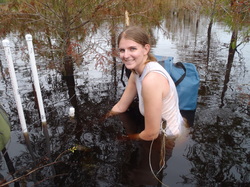
We recently caught up with former master’s student Valerie Schoepfer, whose career since graduating has really gone under. Down under that is, as she is currently working on her doctorate at Southern Cross University in Lismore NSW, Australia.
The research center there, Southern Cross GeoScience, is dedicated to issues surrounding the intersection of geology and chemistry.
“In my case, this is looking at contaminated soils and waters near acid mine drainage and acid sulfate soils,” Schoepfer said. “I've always been interested in phosphorus chemistry, from science summer camps to the high school state and national science fairs.
Her undergraduate degree was one in soil and watershed management, and her master’s was related to iron and sulfur in a coastal wetland.
“Now I've come full circle, looking at iron and sulfur minerals and the influence of phosphate on their behavior,” she said. “Chemistry has been a steady part of my life since middle school, so it made perfect sense to keep going with something that sparked my interest and has the potential to make a real difference in the world we live in.”
When she first started at Nebraska, an unfortunate turn of events ended up having a silver lining.
“My master’s degree was originally set to be related to nitrogen and sulfur in a coastal wetland that was impacted by salt water incursion. Plans changed when we got to the site for the first time and basically couldn't find nitrogen,” she said. “However, we found plenty of iron, and thus my iron/sulfur project began. It was a few grueling field seasons and lab sessions, but I published that work and emailed a potential PhD supervisor (in Australia), inquiring if any funding was available. He replied that night, and said he had just read my thesis online. He offered me the PhD position on the spot. So now I'm in Australia, pursuing a PhD in GeoChemistry.”
Schoepfer says the School of Natural Resources really helped her prepare for her newest position.
“Doing research and coursework taught me skills I needed to set me up for a successful PhD in the GeoSciences. For example, to be able to read and interpret scientific literature, then summarize and translate that into logical scientific communication on my end to get published. I think the most important thing I learned in SNR was how to critically evaluate a problem — whether it was a chemical equation, an instrument causing trouble, or how to find a literature gap. The problem solving skills have really made a difference.”
Working on a doctorate, though, is a fulltime job with many ups and downs. For Schoepfer, having the independence to work on projects has been both enjoyable and difficult.
“I enjoy being able to work when I need to work. … I make my own timelines, my own due dates,” she said. “If I don't understand something, I have the freedom to dedicate a day to one chemical reaction. No outside pressure to finish the paper by a certain day. It’s done when I think it’s done.
“Part of that independence is knowing when enough is enough. Knowing when that paper you've been agonizing over is ‘just done.’ When that calculation is just confusing and you need to take a break. Knowing when to ask for help. So the independence is both the best and worst part of the job.”
And it’s still a job filled with joy.
“I didn't stick with my undergrad management degree,” she said. “I switched to chemistry because it was what got me out of bed in the morning, it’s what got me excited about the day, it’s what made me smile.” So her advice to current and future SNR students is to “Go with your joy.”
“Go with what gives you joy deep down,” she said. “Maybe that one assignment you couldn't put down or that one chapter you actually wanted to read. Pursue it. Maybe there wasn't a full course dedicated to that one topic, but there can be. You can make a PhD career out of anything.”
Elyse Watson, Natural Resources